Historic Broadband Investments, $120+ Million Coming to Maine
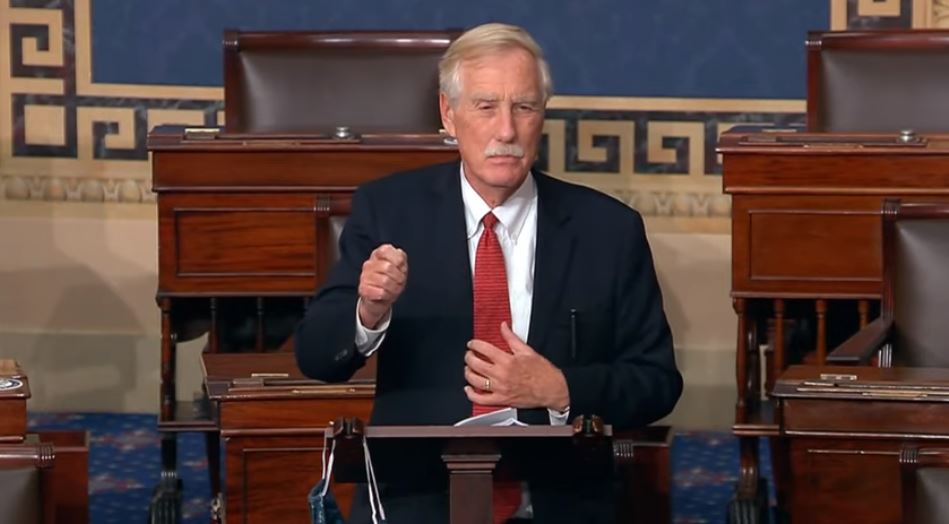
The coronavirus pandemic has cost Americans so much already; we cannot allow another casualty of this virus to be the widening of the digital divide harming our rural and underserved communities. The pandemic has made one thing clear: if you don’t have access to an affordable, high-speed connection, it’s a challenge to access telemedicine, educate our students remotely, or work from home.
That's why I negotiated with the White House and my Congressional colleagues to include dedicated funding in the American Rescue Plan to boost connectivity. Funds for broadband infrastructure and digital equity will create jobs in the short-term to speed America’s economic recovery, and support long-term economic success for rural communities by allowing Americans to pursue economic and educational success, no matter where they live.
Here’s what’s in the package:
- $10 billion for broadband deployment and infrastructure, digital inclusion and other efforts to close the digital divide. This funding will be provided directly to states, territories and tribal governments in order to support broadband deployment and a broad set of flexible uses to improve broadband infrastructure, digital inclusion and related efforts.
- More than $7 billion to expand educational connectivity. The closure of schools has been one of the most devastating impacts of COVID-19, forcing students, parents and teachers alike to adjust to “Zoom school,” but the challenges are even more extreme for students without reliable access to broadband or internet-connected devices.
- Flexibility for state and local governments. The American Rescue Plan ensures that broadband investments are an explicit, eligible use for stimulus funds by states and localities, in addition to the $10 billion dedicated fund.
Spotlighting Broadband on “Inside Maine” with Tilson’s Josh Broder and Kathryn de Wit of Pew Charitable Trusts
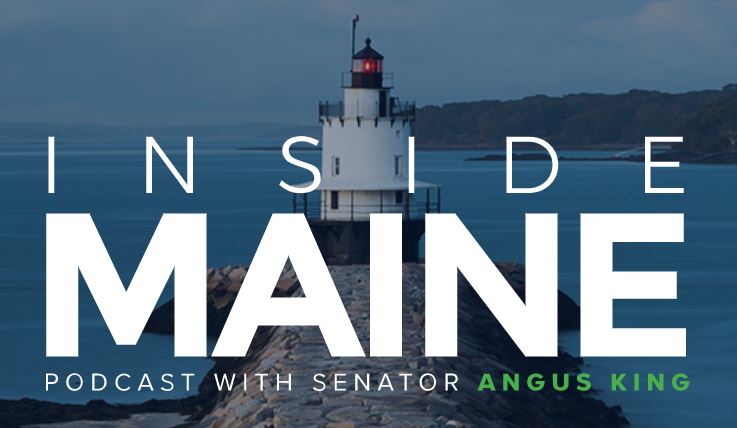
The March edition of "Inside Maine" focused on the importance of broadband to Maine people during the coronavirus pandemic, and the importance of confronting the widening digital divide.
The episode featured Josh Broder, CEO of Tilson Technologies and Co-Chair of the Governor’s Economic Recovery Committee, who joined me to discuss how the funds will directly support economic recovery efforts in the state, boost national efforts to improve broadband infrastructure, and support long-term economic growth in communities across Maine. In the second segment, Kathryn de Wit of Pew Charitable Trusts joined me to discuss the vital role of connectivity in 21st century life, and policy options to close the digital divide and empower states, localities, and tribes to improve access to high-speed broadband nationwide.
The link to the March podcast can be found HERE.
Josh Broder and I also participated in “Maine Calling” – along with Kerem Durdag of GWI – to discuss broadband expansion with Maine people, and answer some really smart questions. Listen HERE
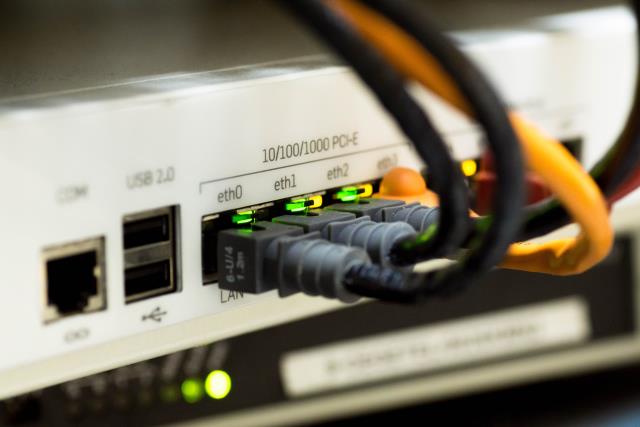
In addition to working with my colleagues to secure this critical funding, I pushed forward the follow legislative efforts to close the digital divide this month:
- Introduced bipartisan legislation to provide internet hotspots to rural Americans. The Hotspots and Online Technology and Services Procurement for our Tribes and States (HOTSPOTS) Act, the bill would create a 2-year, $200 million hotspot pilot program with a minimum allotment of $2 million per state to allow states, tribes, and territories to purchase and distribute Internet-connected devices to libraries in low-income and rural areas. Read more HERE
- Urged the Biden Administration to create a modern, unified federal broadband standard. I joined my colleagues in leading a bipartisan letter to raise the importance of updating federal standards for high-speed broadband to reflect modern uses and align those standards across all government agencies who support broadband. Read more HERE
Read more about what impact these investments will have in Maine in my op-ed in the Bangor Daily News: American Rescue Plan includes historic broadband investment for Maine
American Rescue Plan Enacted into Law
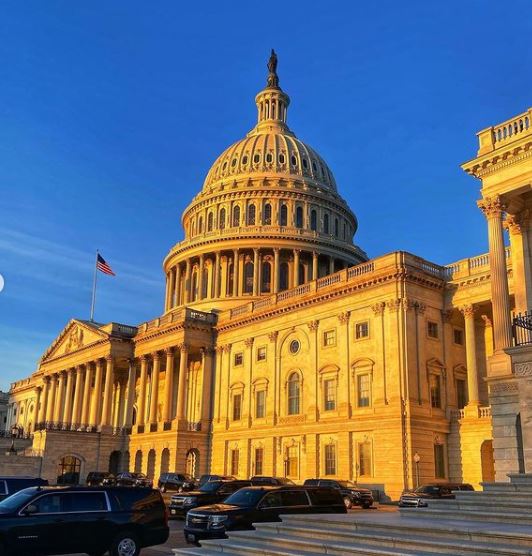
After 28 amendments, hours of debate, intense negotiations, and a 25 hour non-stop session, the Senate passed the American Rescue Plan — by one vote.
(via @anguskingmaine on Instagram)
Over the past year, the coronavirus pandemic has killed more than 500,000 of our family, friends, and neighbors, and exacted a devastating toll on our economy. In the face of a catastrophe of this scale, the American people need bold federal leadership to help bring this virus under control and address the pandemic’s impact on every aspect of our society. The American Rescue Plan is the right bill for this critical moment – and with President Biden’s signature earlier this month, I am thrilled to tell Maine people that help is on the way. It is time to beat this virus down and lift our economy up.
- The bill includes $160 billion in essential funding to address the ongoing public health emergency, ensuring we have the resources needed to control this virus and vaccinate the American people.
- This legislation will also address the secondary effects of COVID-19 – including delivering desperately-needed financial support to working families through targeted direct payments heading to many bank accounts or mailboxes soon, extending unemployment benefits, and providing additional resources to help school districts safely reopen.
- The bill also addresses longstanding inequalities exacerbated by the coronavirus pandemic by adjusting the Child Tax Credit to help lift 10,000 Maine children out of poverty and investing key resources into broadband expansion, which is essential to remote learning, telehealth for seniors, and working from home – all crucial in our fight against the impacts of the pandemic.
Read more about the American Rescue Plan in my op-ed for the Portland Press Herald from the day we passed the bill: $1.9 trillion COVID bill meets the moment
March Policy Update
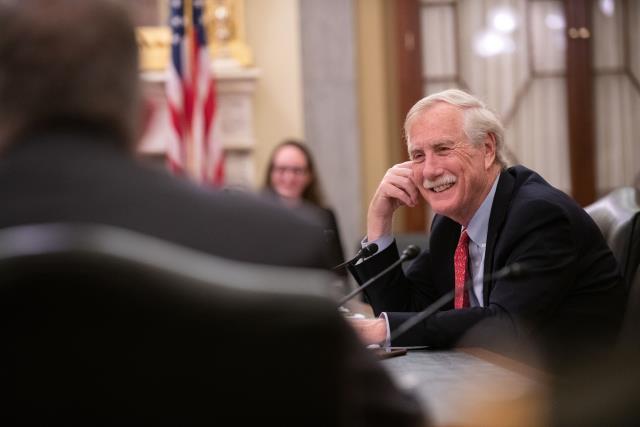
In addition to the success of the American Rescue Plan, further progress was made on several issues. As a reminder, you can read more on my regularly updated press release page at king.senate.gov. Here are some other priorities I’ve been working on:
- Introduced legislation to reform and improve student loan repayment process. I joined Richard Burr (R-N.C.) to reintroduce the Repay Act, legislation that simplifies and streamlines the current repayment programs by establishing two, easy-to-navigate repayment plans: a fixed, 10-year repayment plan and a single, simplified income-driven repayment option. Read more HERE.
- Reaffirmed commitment to increase the federal minimum wage. In consideration of the COVID relief package, I voted no against a procedural vote to increase the minimum wage for two reasons: first, a COVID relief bill wasn’t the appropriate place to enact this needed legislation; second, it included a provision that would entirely eliminate the tip credit – hurting service employees in Maine and nationwide. This was a hard decision, and because I do support increasing our minimum wage, I pledge to work towards its passage. Read my full statement HERE.
- Cosponsored the Equality Act. The Equality Act is historic, comprehensive legislation that would ban discrimination against LGBTQ Americans, and I'm proud to support it. The legislation would amend existing federal anti-discrimination laws to explicitly add sexual orientation and gender identity to be protected against discrimination in employment, housing, public accommodations, jury service, access to credit, federal funding, and more. Read more HERE.
- Pushed to increase mental health resources for healthcare providers. Senator Susan Collins (R-Maine) and I joined a bipartisan group of colleagues in introducing the Dr. Lorna Breen Health Care Provider Protection Act. This comprehensive, bipartisan legislation would help to reduce and prevent suicide, burnout, and mental and behavioral health conditions among health care professionals. Read more HERE.
Campaign Finance Reform
As the Senate considers S.1: the For the People Act, campaign finance reform has taken a front and center seat in our daily priorities. This month, I've introduced multiple bills that aim to increase transparency in our elections, and highlighted the dangerous impacts of gerrymandering in a Rules & Administration Committee hearing.
- Cosponsored the Spotlight Act. The bill would require certain political non-profit organizations to disclose their donors to the Internal Revenue Service (IRS), reversing a rule that eliminated the requirement and allowed such organizations to keep their donors secret. Read more HERE.
- Introduced the Real Time Transparency Act. The bill which would require that all political contributions of $1,000 or more be filed with the Federal Election Commission (FEC) within 48 hours. Read more HERE.
- Cosponsored the Sunlight for Unaccountable Non-Profits (SUN) Act. The bill would require the IRS to publish the names of any donors who give more than $5,000 to tax-exempt political organizations. Both pieces of legislation are designed to increase transparency and help inform voters about who is funding the candidates on their ballot. Read more HERE.
- Pressed current and former election officials on the anti-democratic impacts of gerrymandering. The problem is, instead of the voters choosing the politicians, the politicians choose the voters. Watch my full exchange HERE.
Committee Round-Up
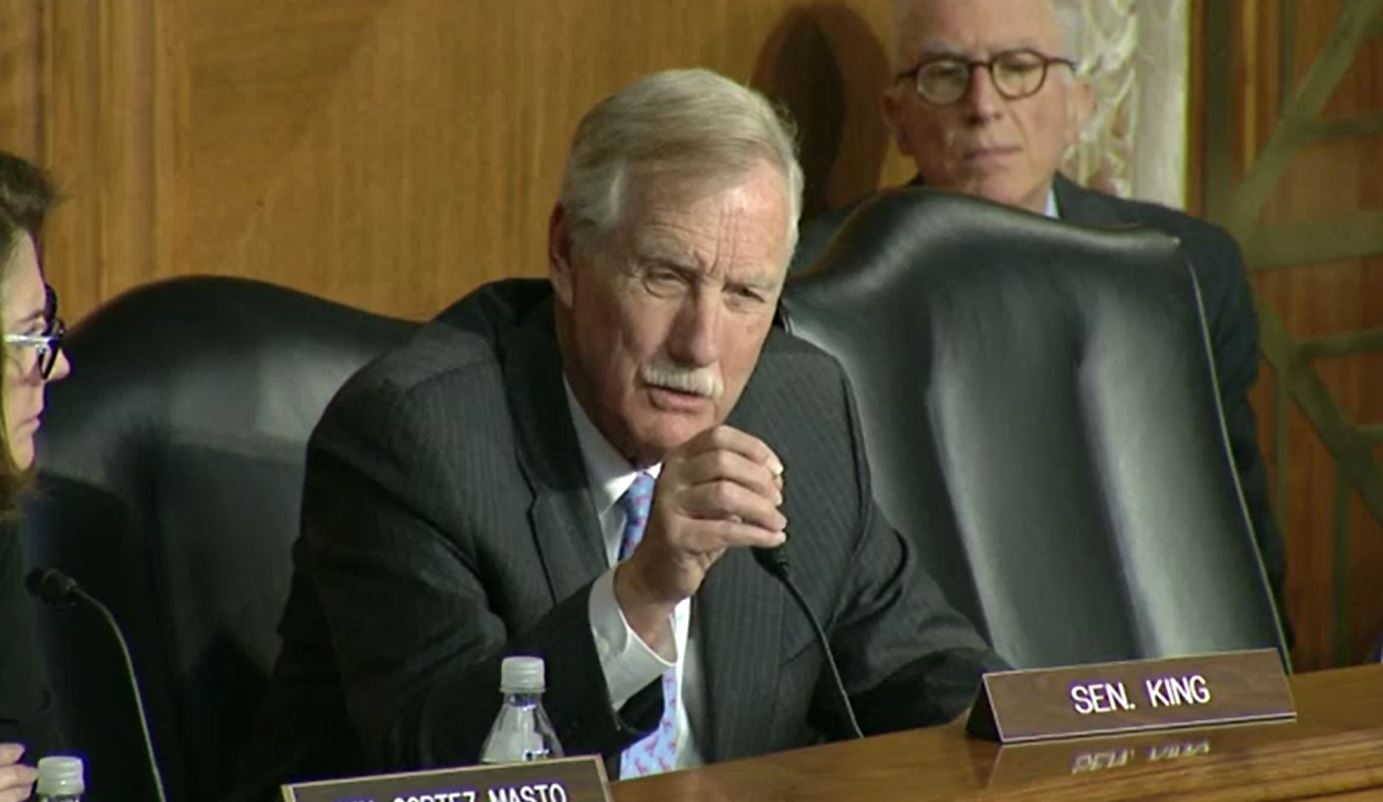
Committee work is one of the most important parts of my work here for all of you. I enjoy the chance to ask questions to witnesses, generate information for the American people, and hold officials accountable. I currently serve on the Armed Services Committee, the Energy and Natural Resources Committee, the Intelligence Committee, and the Rules & Administration Committee.
Earlier this month, I announced my official subcommittee chairmanships for the 117th Congress:
- Chairman of the Energy and Natural Resources Subcommittee on National Parks. Generations of Americans have worked to protect the beauty and wonder of America’s national parks for their children – there is good reason they have been called ‘America’s Best Idea.’ Now, it is our turn to carry this legacy forward. I’m honored to assume this position, and commit to working alongside my Senate colleagues and the Biden Administration to strengthen the implementation of the Great American Outdoors Act and find new opportunities to help the American people access our awe-inspiring public lands.
- Chairman of the Senate Armed Services Subcommittee on Strategic Forces. I’m honored to assume the Chairmanship of the Senate Armed Services Subcommittee on Strategic Forces, which plays a critical role in overseeing our nation’s nuclear and strategic forces, including arms control and non-proliferation efforts. As the United States grapples with fast-evolving new threats in an increasingly dangerous world, the work of this subcommittee will be vital to maintaining the strongest national security posture possible in the face of both current and future threats.
Connecting with Maine People through the Pandemic
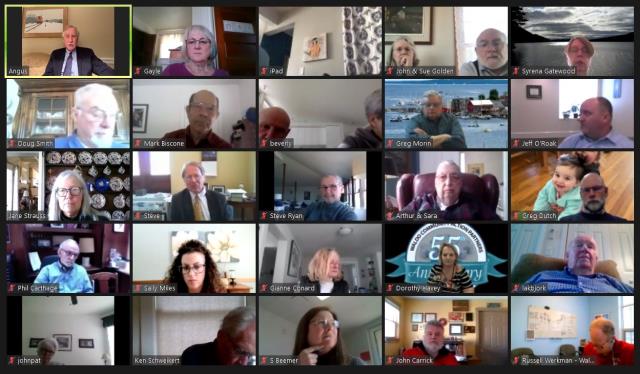
Members of the Belfast Rotary Club
Even as the pandemic changes the way we interact, I've made it a priority to engage with Maine people from all walks of life and helpful organizations to address questions surrounding the coronavirus pandemic and identify remaining work to be done. Starting last year, I held a tele-town hall, inviting all Maine people to call in toll-free, to listen and respond to questions about coronavirus response efforts. Ever since then, I’ve made it a point to stay connected with Maine people in teleconferences and phone calls with:
- Maine healthcare providers and advocates, such as the Maine Dental Association and Protect our Care.
- Maine students and educators, including the 16 Maine 2020 County Teachers of the Year, Maine Jump$tart Coalition’s two Finance Educators of the Year, school psychologists, MLTI Virtual Student Conference, University of Maine System Student Veterans, and civics and history teachers from schools across Maine.
- Maine business and community leaders, including members of the Houlton Rotary Club, Maine State Chamber of Commerce, Maine Coast Fishermen’s Association, Penobscot Bay Regional Chamber of Commerce, the New England Council, 120 of Portland’s small business owners and 500 Maine employees of Sun Life.
- Maine nonprofits including the Maine Arts Commission, Maine Association of Nonprofits (MANP), United Way and YMCA Youth Advocates from Maine.
- Maine seniors in a call hosted by AARP Maine.
- Maine democracy-focused organizations, such as the Maine League of Women Voters.
In the News
Thanks for subscribing to my monthly newsletter! I would love to hear your ideas for how we can make Maine and our country a better place. Please feel free to reach out with any questions, comments, or concerns by visiting: https://www.king.senate.gov/contact —we look forward to hearing from you.
***PLEASE NOTE***
Due to the impacts of COVID-19, my staff in Washington, D.C. are working remotely – but we’re still at work, ready to help you navigate any challenges you’re facing during this challenging time.
All the best, and stay healthy!

To unsubscribe to this e-Newsletter click HERE.
|